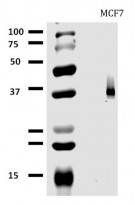ARG62815
anti-EpCAM antibody [323/A3]
anti-EpCAM antibody [323/A3] for Flow cytometry,ICC/IF,IHC-Formalin-fixed paraffin-embedded sections,Immunoprecipitation,Western blot and Human
Controls and Markers antibody; Epithelial Marker antibody; Circulating Tumor Cells BioMarker antibody
Overview
| Product Description | Mouse Monoclonal antibody [323/A3] recognizes CD326 / EpCAM |
|---|---|
| Tested Reactivity | Hu |
| Species Does Not React With | Rat |
| Tested Application | FACS, ICC/IF, IHC-P, IP, WB |
| Specificity | The clone 323/A3 recognizes CD326 / EpCAM, a marker of epithelial lineages, that is over-expressed in many carcinomas. |
| Host | Mouse |
| Clonality | Monoclonal |
| Clone | 323/A3 |
| Isotype | IgG1 |
| Target Name | EpCAM |
| Antigen Species | Human |
| Immunogen | Human breast cancer MCF-7 cells_x000D_ |
| Conjugation | Un-conjugated |
| Alternate Names | MIC18; EGP; Tumor-associated calcium signal transducer 1; Epithelial glycoprotein 314; KSA; Ep-CAM; Epithelial cell surface antigen; Adenocarcinoma-associated antigen; HNPCC8; Cell surface glycoprotein Trop-1; EGP40; TACSTD1; KS1/4; hEGP314; Major gastrointestinal tumor-associated protein GA733-2; M4S1; MK-1; Epithelial glycoprotein; KS 1/4 antigen; ESA; DIAR5; EGP314; Epithelial cell adhesion molecule; EGP-2; TROP1; CD antigen CD326 |
Application Instructions
| Application Suggestion |
|
||||||||||||
|---|---|---|---|---|---|---|---|---|---|---|---|---|---|
| Application Note | IHC-P: Pretreatment: Tissue section digestion with pepsin (15 min at RT or 10 min at 37°C, 1 mg / ml Tris-HCl, pH 2.0). * The dilutions indicate recommended starting dilutions and the optimal dilutions or concentrations should be determined by the scientist. |
||||||||||||
| Positive Control | WB: A431, MCF7 and SW480 IHC-P: Breast carcinoma |
Properties
| Form | Liquid |
|---|---|
| Purification | Purified from cell culture supernatant by protein-A affinity chromatography. |
| Purity | > 95% (by SDS-PAGE) |
| Buffer | PBS (pH 7.4) and 15 mM Sodium azide |
| Preservative | 15 mM Sodium azide |
| Concentration | 1 mg/ml |
| Storage Instruction | For continuous use, store undiluted antibody at 2-8°C for up to a week. For long-term storage, aliquot and store at -20°C or below. Storage in frost free freezers is not recommended. Avoid repeated freeze/thaw cycles. Suggest spin the vial prior to opening. The antibody solution should be gently mixed before use. |
| Note | For laboratory research only, not for drug, diagnostic or other use. |
Bioinformation
| Database Links | |
|---|---|
| Gene Symbol | EPCAM |
| Gene Full Name | epithelial cell adhesion molecule |
| Background | EpCAM is a carcinoma-associated antigen and is a member of a family that includes at least two type I membrane proteins. This antigen is expressed on most normal epithelial cells and gastrointestinal carcinomas and functions as a homotypic calcium-independent cell adhesion molecule. The antigen is being used as a target for immunotherapy treatment of human carcinomas. Mutations in this gene result in congenital tufting enteropathy. [provided by RefSeq, Dec 2008] |
| Function | EpCAM may act as a physical homophilic interaction molecule between intestinal epithelial cells (IECs) and intraepithelial lymphocytes (IELs) at the mucosal epithelium for providing immunological barrier as a first line of defense against mucosal infection. Plays a role in embryonic stem cells proliferation and differentiation. Up-regulates the expression of FABP5, MYC and cyclins A and E. [UniProt] |
| Research Area | Controls and Markers antibody; Epithelial Marker antibody; Circulating Tumor Cells BioMarker antibody |
| Calculated MW | 35 kDa |
| PTM | Hyperglycosylated in carcinoma tissue as compared with autologous normal epithelia. Glycosylation at Asn-198 is crucial for protein stability. |
Images (2) Click the Picture to Zoom In
-
ARG62815 anti-EpCAM antibody [323/A3] WB image
Western blot: MCF7 whole cell lysate stained with ARG62815 anti-EpCAM antibody [323/A3], in non-reducing conditions.
-
ARG62815 anti-EpCAM antibody [323/A3] WB image
Western blot: MCF7 whole cell lysate stained with ARG62815 anti-EpCAM antibody [323/A3], under non-reducing condition.
Clone References









